Full meaning of NAPTIP in Nigeria and its functions in 2024
Nigeria is among the countries with the highest human trafficking rates in the world. Many organizations like NAPTIP are helping the government to stop this crime. They teach the public how this illegal act affects the victims and society, how they can spot human traffickers and victims, how to protect themselves from human traffickers, how to help the victims, and so on. This article expounds on NAPTIP's meaning and how the agency fights human trafficking in Nigeria.
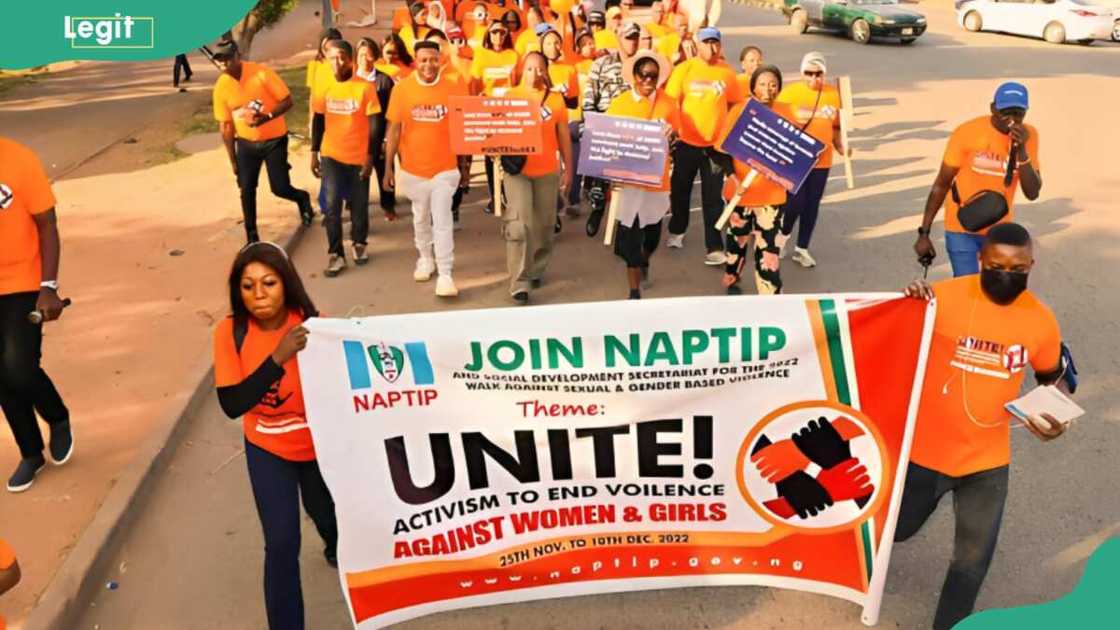
Source: Facebook
Since the vulnerable, the marginalized, and defenseless are the main targets of human trafficking, NAPTIP cares about every community member (men, women, and children). One of the ways the organization protects them is by teaching society the signs of human trafficking activities around them so that they can report to the authorities.
NAPTIP's meaning and its functions
NAPTIP stands for the National Agency for Prohibition of Trafficking in Persons. The non-profit public entity was created on July 14, 2003, under the Trafficking in Persons Enforcement and Administration Act 2003. NAPTIP has offices in 32 states in Nigeria, and since the agency's inception, over 400 human trafficking offenders and more than 200 sexual offenders have been sentenced between 2006 and 2023. Below are the primary functions of NAPTIP:
1. It ensures the laws against human trafficking are enforced
NAPTIP ensures laws enacted by the Nigerian government against human trafficking are effective. It has established a system for monitoring human trafficking activities on trans-borders. The system also helps the agency to identify suspicious movements and persons.
The agency can arrest, detain, and prosecute offenders. Also, it has a team of investigators, lawyers, and prosecuting counsels who ensure the law punishes the perpetrators.
Also, NAPTIP can trace, seize, detain, or retain any property the agency believes was used in committing offenses for investigation and prosecution. They can enter, search premises suspected of being used for crimes, and close them.

Source: UGC
2. NAPTIP rescues human trafficking victims
NAPTIP officials blocked an attempt to smuggle ten children from Nigeria to Russia during the 2018 World Cup in June. This is only one of the many cases where the organization has saved human trafficking victims. Its teams of investigators and prosecuting counsels undergo strategic training that helps them detect human trafficking activities and rescue the victims.
3. It implements strategies aimed at preventing human trafficking
The agency uses a set of tactics that have revolutionized the battle against human trafficking in Nigeria. For instance, NAPTIP collaborates with the National Judicial Institute (NJI), judges, and prosecutors to fight GBV cases.
In most cases, gender-based violence is an important driver of human trafficking. People from abusive homes are more vulnerable to emotional or financial exploitation by traffickers. Therefore, they can easily be lured by strangers who eventfully force them into sex work, manual and domestic labor, and child labor. Thousands of women and children from Nigeria are trafficked abroad, especially to Europe.
Since traffickers use the internet (emails and social media) to trap their victims, NAPTIP has partnered with Meta (Instagram, Facebook, and WhatsApp owners) and NCMEC (United States National Centre for Missing and Exploited Children) to tackle online child exploitation. Also, the organization launched the NAPTIP iReporter app in collaboration with the Canadian government.
On top of that, the NAPTIP Service Charter, NAPTIP Disability Inclusion Policy, policy documents, and Audio-Visual Materials have been translated into braille for the deaf and blind.
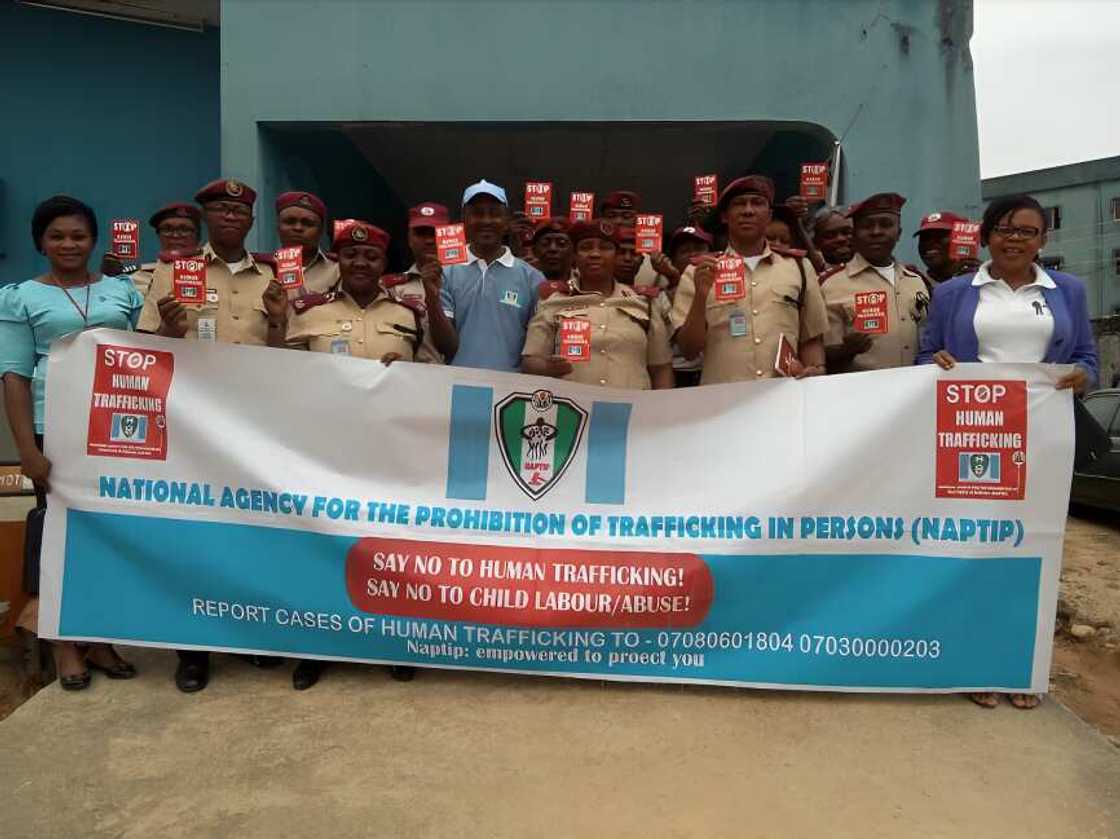
Source: Facebook
4. NAPTIP investigates and prosecutes the perpetrators of human trafficking
The agency investigates crimes that promote or are connected to human trafficking directly or indirectly. From 2004 to 2023, 599 human traffickers NAPTIP arrested have been found guilty.
Everyone is encouraged to report human trafficking and any form of modern slavery on the NAPTIP iReporter app. Some of the crimes you can report for NAPTIP to investigate are:
- Kidnapping
- Exploitive labor for adults
- Child labor
- Prostitution and sex work
- Illegal immigrants
- Illegal organ harvesting/donation
- Forced marriage
- Purchase/sale of persons
- Deceptive recruiting for labor/services
- Debt bondage
5. It creates public awareness and encourages people to fight human trafficking
NAPTIP sensitizes people about how human traffickers operate. For example, the agency held a bus campaign in collaboration with the ARK Group. The campaign was funded by Immigration, Refugees and Citizenship Canada (a department of the Government of Canada), and it taught people how to look for signs of human trafficking while using public buses and vehicles.
Also, NAPTIP teaches the public how to help human trafficking victims heal emotionally and mentally. Some may be exposed to HIV/AIDS, infections, substance abuse, and mental/emotional health risks like anxiety, guilt, shame, depression, memory loss, stigma, and trauma.
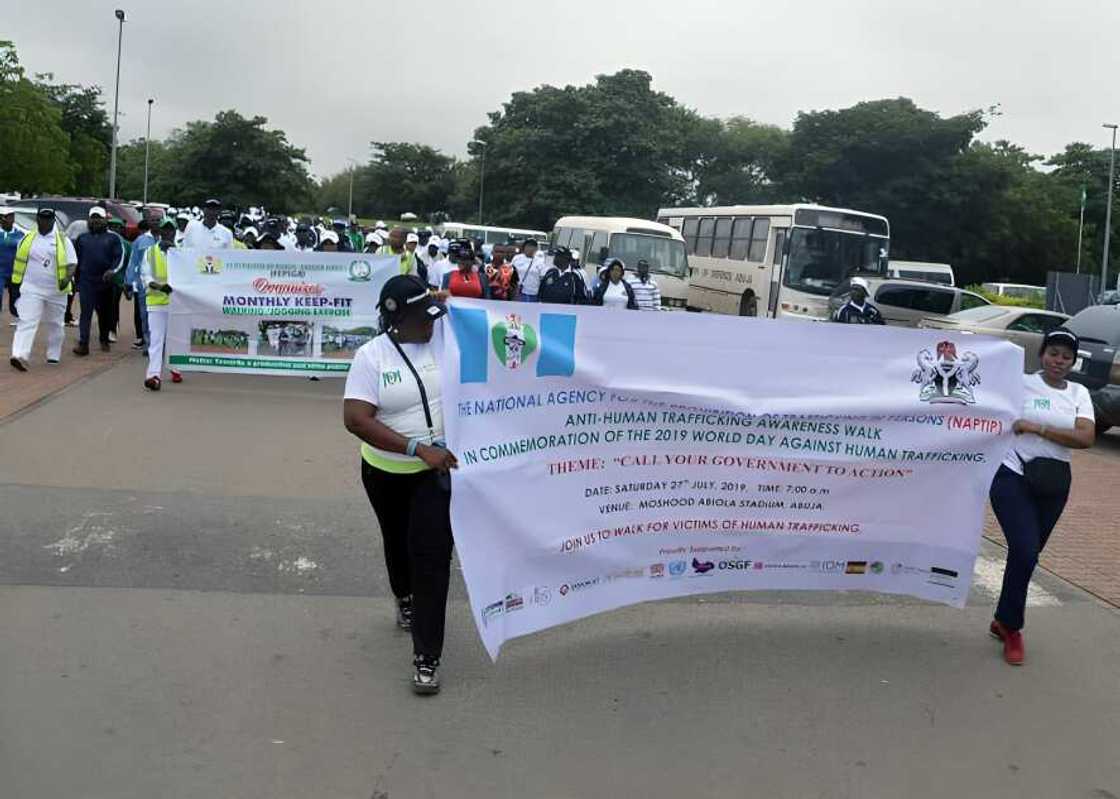
Source: Facebook
6. NAPTIP researches about human trafficking and related crimes
NAPTIP does in-depth research about human trafficking and related crimes to help the government and the people understand how these crime rings operate. The findings usually help the public and government adopt effective preventive and defensive mechanisms.
For instance, the NAPTIP statistics from 2019 to 2022 revealed that 61% of human trafficking cases occur within the country, while 39% are cross-border trafficking through land borders and by road transportation. These findings helped the public and public transport stakeholders to be vigilant in looking out for signs and reporting suspected cases of human trafficking.
7. It counsels and rehabilitates survivors of human trafficking and modern slavery

Read also
BUA group clarifies reported plans to share N500,000 to 3 million businesses, advises Nigerians
NAPTIP provides rehabilitation programs to human trafficking and modern slavery victims to help them heal emotionally and mentally. Some victims are exposed to HIV/AIDS, infections, substance abuse, and mental/emotional health risks like anxiety, guilt, shame, depression, memory loss, stigma, and trauma.
All rescued victims are taken to NAPTIP shelters, where experienced social workers, medical experts, trained volunteers, and educators care for them. They are taught vocational skills like knitting, weaving, beads making, fashion design, catering, beauty and hairdressing, hat making, and photography. The agency also teaches the public how to help the survivors heal once they leave the shelters.

Source: UGC
8. NAPTIP protects human trafficking victims and witnesses
NAPTIP has 13 shelters across Nigeria that protect victims and survivors. Any witnesses are also offered protection. Most missing people cases in Nigeria are triggered by families reporting suspicions directly related to human trafficking. The constitution provides for the witness protection agreement in writing. It must be entered into by the relevant agency, the witness (or each related person (parent or guardian of a minor)).
9. It can deport anyone involved in trafficking in persons
NAPTIP deals with matters connected with the extradition and deportation of persons convicted of trafficking of persons. One of the top convictions was the extradition of a high-profile female trafficker to Italy on March 8, 2023, to serve a 13-year jail term.
NAPTIP gets mutual legal assistance from the Nigerian government and other countries, under the supervision of the Minister, extradition and deportation of people involved in human trafficking.
10. It collaborates with government bodies within and outside Nigeria whose functions are similar to those of the agency
NAPTIP facilitates the exchange of scientific and technical information concerning or relating to trafficking in persons with government bodies within and outside Nigeria.
The agency can exchange experts and share information about the identities, locations, and activities of persons suspected of being involved in human trafficking and related crimes. It can also move proceeds or properties derived from trafficking in persons and related offenses.
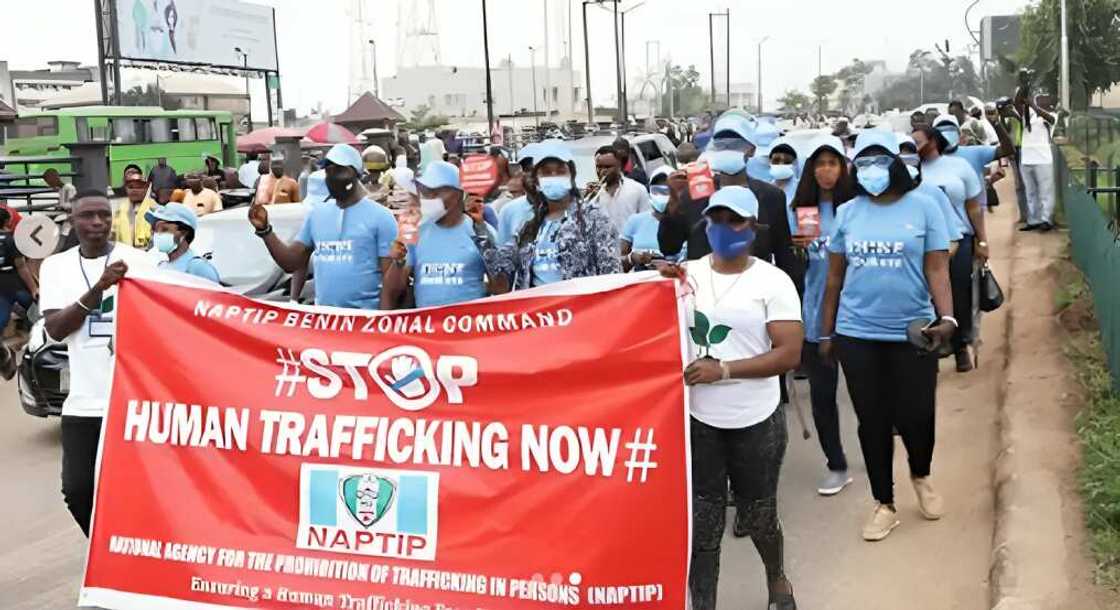
Source: UGC
When was NAPTIP established?
NAPTIP was established on July 14, 2003, by the Trafficking in Persons (Prohibition) Enforcement and Administration Act 2003.
What are the objectives of NAPTIP?
The Anti-Trafficking Act established NAPTIP with the primary responsibility to investigate and prosecute the perpetrators of human trafficking and modern slavery and counsel/rehabilitate the victims/survivors.
What are the functions of NAPTIP?
The National Agency for Prohibition of Trafficking in Persons has many functions in Nigeria. Below are the main ones:
- It ensures the laws against human trafficking are enforced.
- NAPTIP rescues human trafficking victims.
- It implements strategies aimed at preventing human trafficking.
- NAPTIP investigates and prosecutes the perpetrators of human trafficking.
- It creates public awareness and encourages people to fight human trafficking.
- NAPTIP researches about human trafficking and related crimes.
- It counsels and rehabilitates human trafficking and modern slavery survivors.
- NAPTIP protects human trafficking victims and witnesses.
- It can deport anyone involved in trafficking in persons.
- It teams up with state bodies within/outside Nigeria whose operations are similar to the agency's.

Read also
FG raises alarm over emergence of a new sect separating children, sends message to Nigerians

Source: Facebook
What is the average NAPTIP salary?
The average salary for a Principal Intelligence Officer, an IT Support Analyst, and an Intelligence Officer working at NAPTIP is N149,450.
Is NAPTIP recruiting job seekers?
You should be careful with fake authors advertising NAPTIP Recruitment. The agency will take action against such activities and has warned the public to shun these false recruitment editorials to avoid exploitation.
How do I contact NAPTIP offices in Nigeria?
You can contact NAPTIP offices through these channels:
- Address: No. 2028, Dalaba Street, Wuse Zone 5, FCT Abuja, Nigeria
- Toll-free line: 0800CALLNAPTIP (08002255627874)
- Phone: 07030000203
- Shortcode: 627
- Email: info@naptip.gov.ng
Where is the headquarters of NAPTIP?
The NAPTIP office in Abuja is the agency's headquarters. The offices are in Abuja FCT at Zone 5, Plot 2028 Dalaba Street, Wuse 904101.
Where is the NAPTIP office in Lagos?

Read also
Analyst reacts as Tinubu's government moves to include illegal activities in GDP calculation
The Lagos Zonal Command is at 165 Oba Ladejobi Street, G.R.A, IKeja Ikeja Lagos State.
The NAPTIP logo
The logo has white, blue, and black colors with justice scales and the name "NAPTIP " at the center. The coat of arms of Nigeria is at the top of the word "NAPTIP."
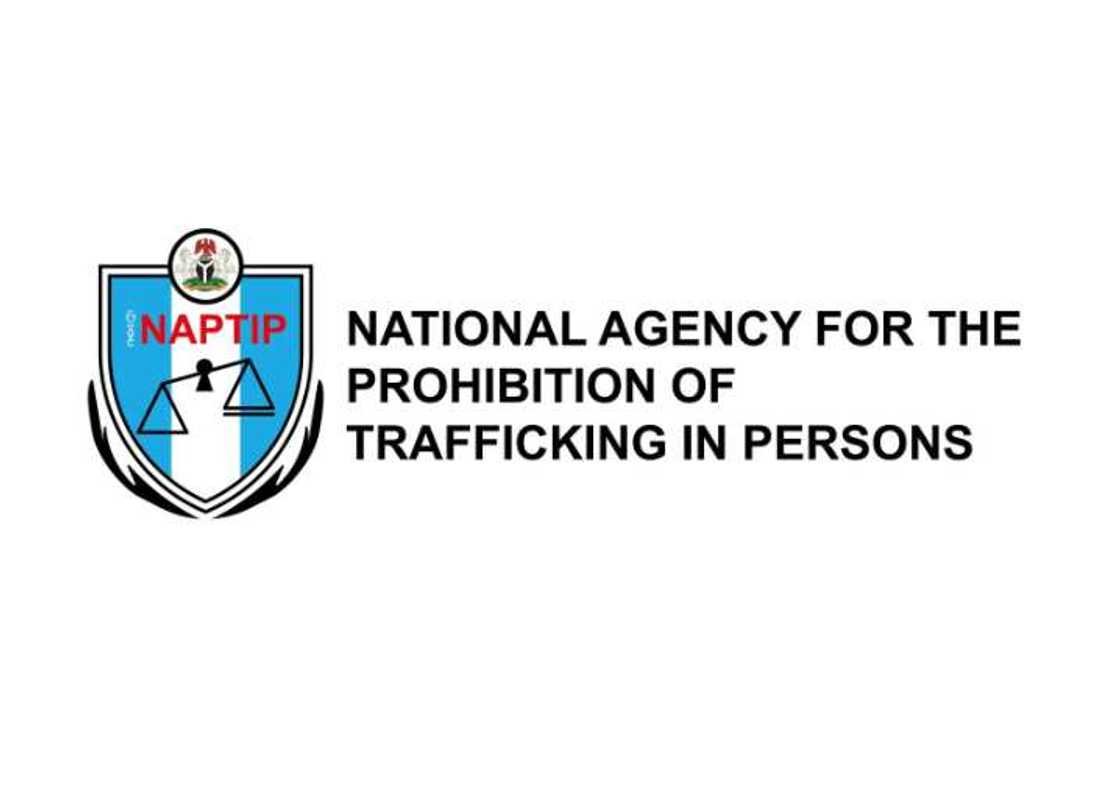
Source: Facebook
NAPTIP online presence
The agency shares information with the public through its official social media pages, YouTube channel, and website. Below are the links to those platforms:
| Platform | Link |
| @NaptipNigeria | |
| @officialnaptipnigeria | |
| X (Twitter) | @naptipnigeria |
| YouTube | NAPTIP NIGERIA |
| Website | naptip.gov.ng |
Now that you know NAPTIP's meaning, functions, and contact details, you can be instrumental in helping the agency fight human trafficking in Nigeria by reporting suspicious activities around you.
Legit.ng shared an insightful article about the organs of the Nigerian government and their functions. The Federal government of Nigeria has three branches: the legislative, executive, and judicial.
Although these arms are independent of each other and have different powers and tasks, they coordinate to promote democracy and law and order in the government.
Source: Legit.ng

Peris Walubengo (Lifestyle writer) Peris Walubengo is a content creator with 3 years of experience in writing informational and entertainment articles, researching, editing, and proofreading. She has a Bachelor of Commerce & IT from the University of Nairobi (class of 2019). She joined Legit.ng in April 2022. She covers bios, marketing & finance, tech, fashion & beauty, recipes, movies and video game reviews, culture & traveling. In 2023, Peris finished the AFP course on Digital Investigation Techniques. Email: perisrodah254@gmail.com.

Adrianna Simwa (Lifestyle writer) Adrianna Simwa is a content writer at Legit.ng where she has worked since mid-2022. She has written for many periodicals on a variety of subjects, including news, celebrities, and lifestyle, for more than three years. She has worked for The Hoth, The Standard Group and Triple P Media. Adrianna graduated from Nairobi University with a Bachelor of Fine Arts (BFA) in 2020. In 2023, Simwa finished the AFP course on Digital Investigation Techniques. You can reach her through her email: adriannasimwa@gmail.com







